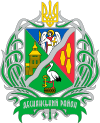Desnianskyi District, Kiev
| Desnianskyi District Деснянський район | |||
|---|---|---|---|
| Raion | |||
|
Desniansky District as seen from the northern outskirts of Kyiv | |||
| |||
.svg.png) | |||
| Coordinates: 50°31′48″N 30°42′15″E / 50.53000°N 30.70417°ECoordinates: 50°31′48″N 30°42′15″E / 50.53000°N 30.70417°E | |||
| Country |
| ||
| Region | Kiev | ||
| Established | 30.12.1987 | ||
| Subdivisions |
List
| ||
| Government | |||
| • Governor | Viktor N. Zherebniuk | ||
| Area | |||
| • Total | 148 km2 (57 sq mi) | ||
| Population | |||
| • Total | 345 200 | ||
| Time zone | EET (UTC+2) | ||
| • Summer (DST) | EEST (UTC+3) | ||
| Area code | 38044 | ||
| Website | http://desn.gov.ua/ | ||
Desnianskyi District (Ukrainian: Деснянський район, translit. Desnians’kyi raion) is an administrative raion (district or borough) of the city of Kiev, the capital of Ukraine. It is located in the north-eastern part of the city on the Left Bank[b] of the Dnieper River and is the most populous district of Kiev. It is also the second largest district with the total area of ca. 14.8 ha.
Desnianskyi District mainly consists of two microdistricts – Troieschyna and Lisovyi – making it predominantly residential in nature. In fact, there is only one clear-cut, (yet small) industrial zone called Kulykove on the border with Dniprovskyi Raion. This fact explains why the district has the lowest number of registered business entities among Kiev raions.[1] Much like commuter town, therefore, Desnianskyi District has very little commercial or industrial activity beyond a small amount of retail, oriented toward serving the locals. However, it differs from commuter towns in that it forms part of the city proper and is not regarded as suburb in a classical sense. Still, its currently weak transportation links with the major part of the city on the Right Bank make it appear as a "city inside a city", which is especially true for Troieschyna microdistrict.[2]
History
The first written reference of the lands which today form part of Desnianskyi District dates back to 1667.[3] Until 1927 the area of the raion belonged to the Oster uyezd of the Chernigov Governorate. Since then it became part of the city of Kiev. In 1932 the area was reorganized under the Petriv (Podil) Raion. It was not until 1987 when the area was reorganized into a separate raion partially out of the neighboring Dnipro Raion and was named as the Vatutin Raion.
Troieschyna
Residential development of what would become known as Troieschyna microdistrict started in 1966. However it was not until the completion of Moskovskyi Bridge in 1976 that the development became genuinely large-scale.[4]
Gallery
 Troyeshchyna microdistrict
Troyeshchyna microdistrict Volhogradska Square – the centre of Lisovyi microdistrict
Volhogradska Square – the centre of Lisovyi microdistrict.jpg) Moskovskyi Bridge – the key transportation link connecting Desnianskyi District with the rest of the city on west bank of the Dnieper river.
Moskovskyi Bridge – the key transportation link connecting Desnianskyi District with the rest of the city on west bank of the Dnieper river. Cathedral of the Holy Trinity in Troyeshchyna microdistrict
Cathedral of the Holy Trinity in Troyeshchyna microdistrict.jpg) Lisovyi avenue in Kiev
Lisovyi avenue in Kiev
Notes
a. ^ Resident population as of 1 January 2009.
b. ^ Informally, Kiev is subdivided into the Right Bank (Ukrainian: Правий Берег) and the Left bank (Ukrainian: Лівий Берег) on the west and east bank of the Dnieper river respectively.
References
- ↑ Vilenchuk, S. R.; Yatsuk, T.B. (eds.) (2009). Kyiv Statistical Yearbook for 2008. Kiev: Vydavnytstvo Konsultant LLC. p. 58. ISBN 978-966-8459-28-3.
- ↑ Darmostyuk, Igor (16 July 2007). "Left Bank Republic". Delovaya Stolitsa (in Russian). 323 (29). Kiev. Retrieved 11 December 2009.
- ↑ Web-site of Kiev city government (in Ukrainian)
- ↑ "Moskovskyi Bridge Commissioned on December 3, 1976" (in Ukrainian). Ukrinform Photo. Retrieved 11 December 2009.
External links
- Kiev City Council Official Webportal (in Ukrainian)


